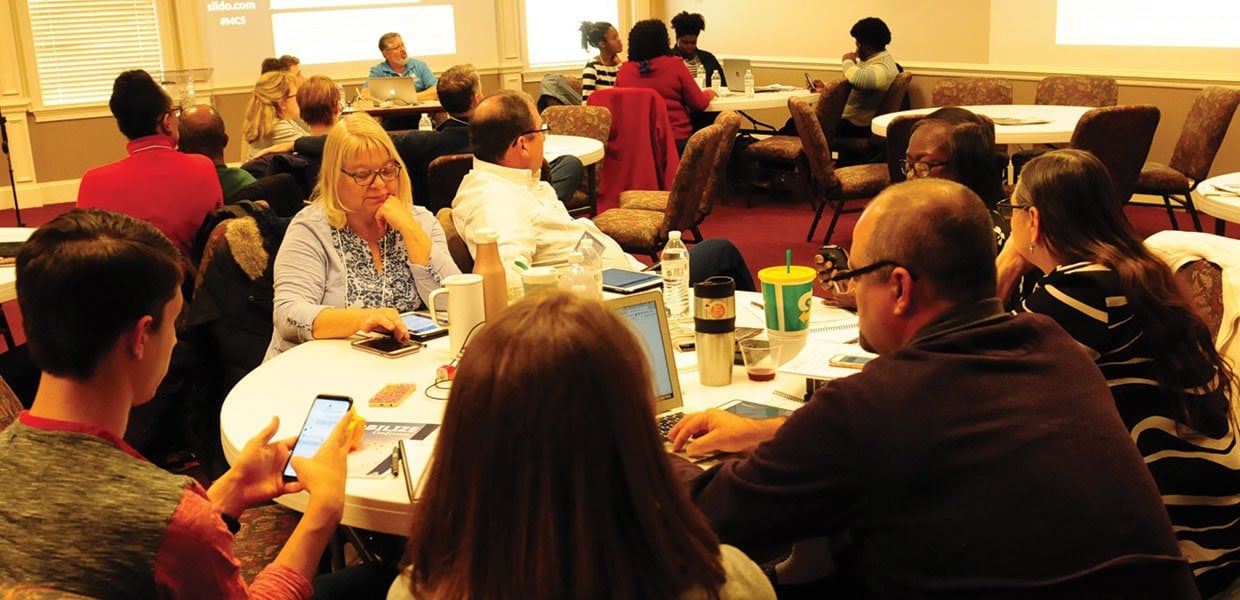
“Mobilize,” a training program that helps churches to attract, engage, and mobilize young adults for the kingdom of God, took place recently at the offices of the Georgia-Cumberland Conference (GCC) church region in Calhoun, United States. About 40 people came to learn more about being intentional in engaging young adults.
GCC director of young adult ministries and Adventist Christian Fellowship (ACF) Don Keele Jr. said, “When we look at the data on young adults, we find that one of the largest points of exodus from the church corresponds with graduation from college. Somehow we haven’t been good at helping young adults transition across from collegiate life to life as a young adult member in the church.”
![The entire church board of the Adventist Fellowship Church in Albany, Georgia, United States, attended the recent Mobilize training at the Georgia-Cumberland Conference regional church office. [Photo: Tamara Walcott Fisher]](https://adventistreview.org/wp-content/uploads/2022/01/gcc-N2b-march19_1008887.jpg)
Keele explained that, not being content with this finding, his team set out to do something about it. “So we have developed a yearly training we call Mobilize to help teach any who cares in the church how to reach out and engage young adults for the sake of the kingdom,” he said.
Not as Difficult as It Seems
Presenter Nate Elias, a pastor at the Peachtree City Church in Atlanta, Georgia, added, “Young adults aren’t nearly as difficult to attract as they may appear. Open to learning about spiritual matters, YAs thrive in exploring spirituality even with church members.”
Elias explained that when adults show care, which includes meaningful equipping, empowering, and mentoring, young adults will recognize it. “YAs want to make their communities a better place, and this includes the church,” he said.
Elias also shared three phases for attracting young adults: “Invite YAs into your ministry service,” he said. “It is the mentoring phase.” By the third Sabbath of a young adult attending, he said, adult members should invite them into specific ministry involvement, the participation phase.
Finally, said Elias, “listen to know young adults’ passions for service and empower them in service,” the empowering phase.
Courtney Mills, a young adult and member of the North River Church in Chattanooga, Tennessee, United States, said her pastor asked her to attend the training because she was recently named the new youth and young adult leader. “It was important to come with an open mind,” Mills said, “and there is a lot to gain from the training since it is a major issue for the church, and it is important to take the initiative.”
A Social Experiment
Another presenter, Justin Yang, pastor of the Atlanta Korean Church, shared that recently he stopped at a fuel station to fill up his car, and he was wearing a jacket with the words “Young Adult Ministries” embroidered on the front. The cashier asked him what the words meant. “It was exciting for me to share that my church wants all young adults to come to church and be part of the family,” Yang said.
Yang shared that after the exchange with the cashier, he went back to his car and wept, for fear that if young adults from the community attended an Adventist church, they might not be welcomed. "Many today are seeking family, something that is lacking, and our churches could easily fill that,” Yang said.
Next, Yang shared that some time ago he did a social experiment. He dyed his hair purple, wore tattoo sleeves and ripped jeans, and went to different churches on Saturday (Sabbath) mornings. “As I was walking up and opened the door, a lady asked, ‘What are you doing here?’ ” Yang was only welcome at six out of 36 Adventist churches he visited over a 12-week period. He says we must cultivate a warm welcome and create a church family where everyone is welcome.
Tanya Leon-Thomas, a member of the Fayette, Georgia, church, said she believes that there is an age segment missing from Adventist churches in the U.S., which corresponds with those who are aged 23 to 35. “We got a lot of food for thought today, as this focus on young adults is desperately needed,” she said. “I am glad we are taking this on as a [church region].”
An original version of this story was posted on Southern Tidingsonline.